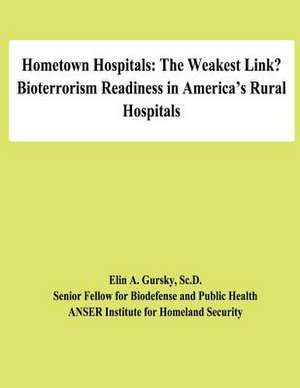Hometown Hospitals
Autor Sc D. Elin a. Gursky, National Defense Universityen Limba Engleză Paperback
Preț: 89.13 lei
Nou
Puncte Express: 134
Preț estimativ în valută:
17.06€ • 18.54$ • 14.34£
17.06€ • 18.54$ • 14.34£
Carte disponibilă
Livrare economică 31 martie-14 aprilie
Preluare comenzi: 021 569.72.76
Specificații
ISBN-13: 9781478194187
ISBN-10: 1478194189
Pagini: 48
Dimensiuni: 216 x 279 x 3 mm
Greutate: 0.14 kg
Editura: CREATESPACE
ISBN-10: 1478194189
Pagini: 48
Dimensiuni: 216 x 279 x 3 mm
Greutate: 0.14 kg
Editura: CREATESPACE
